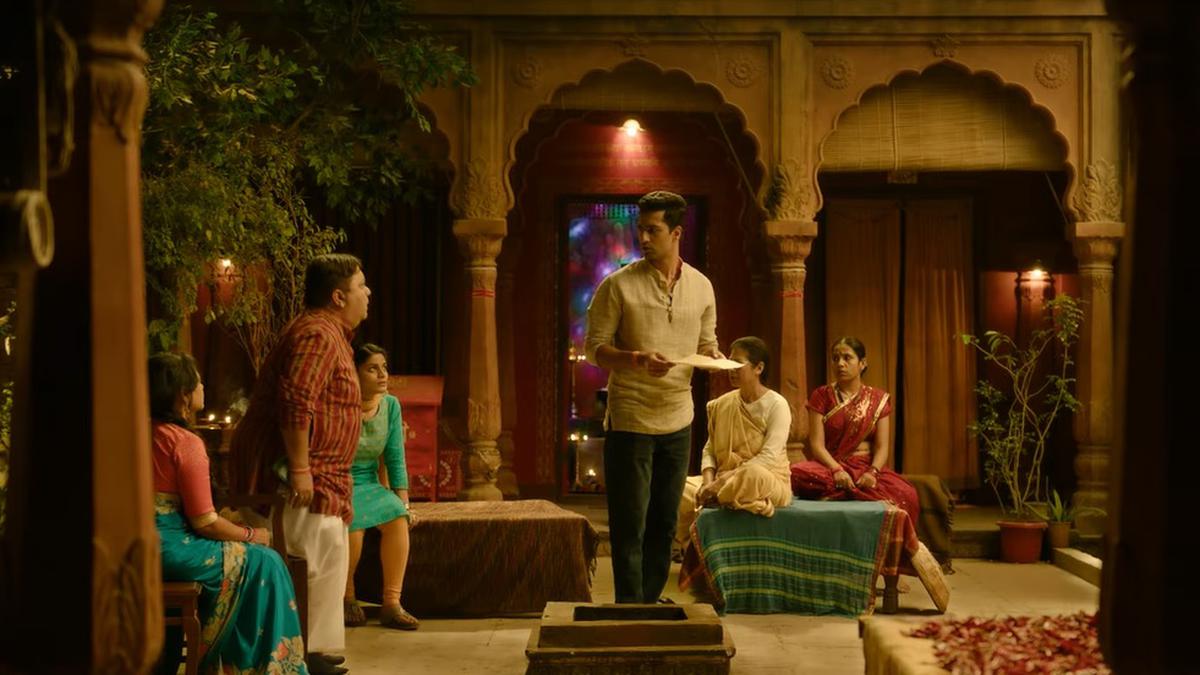
‘The Great Indian Family’ movie review: Vicky Kaushal shines in this sharp drama against religious bigotry
The Hindu
Writer-director Vijay Krishna Acharya addresses the rising hate-mongering in society with a deft touch
More than six decades after director Yash Chopra emphasised the value of Indian DNA in Dhool Ka Phool (1959) and Dharmputra (1961), with the song ‘Tu Hindu Banega Na Musalman Banega, Insan Ki Aulad Hai Insan Banega’ addressing the growing religious bigotry in the aftermath of Partition, Yash Raj banner has recycled the unity in diversity theory for a new generation of audience that is faced with similar threats to the composite fabric.
Son of a respected Hindu priest (Kumud Sharma), Ved Vyas Tripathi (Vicky Kaushal), we are told, was born on December 7 in Balrampur, a city that is not far from Ayodhya. A popular bhajan singer, Ved or Bhajan Kumar as he is popularly known is not too happy with his job profile as even young girls see him only with respect and nothing else. Someone who doesn’t know what it means to be a bigot, Ved doesn’t mind calling himself a member of a self-styled anti-Majnu squad that loves to teach Muslim boys a lesson for fun. One such overture inadvertently brings him close to a Sikh girl (Manushi Chhillar) who is also a gifted performer.
Before their duet could take shape, Ved discovers that he was born to a Muslim mother. As his immediate world starts to crumble as his uncle (Manoj Pahwa) starts to bend under the fear of social pressure and a rival priest (Yashpal Sharma) uses the information to his advantage, Ved sets out on a cultural discovery with the audience in tow. Immaculate casting and tight editing ensure that the didactic layer underneath doesn’t show up. As the boy-next-door, Vicky once again delivers a seamless fusion of emotion and charisma and shines in the company of seasoned players like Kumud and Manoj. The latter shines in a slightly complex role of an uncle called Balak who dotes on his nephew but can’t take a stand against a strident narrative. Perhaps, he embodies the innocent public that is struggling to make the right choice in a polarised atmosphere. Ashutosh Ujjwal and Bhuvan Arora lend freshness as the new set of the hero’s friends.
Primarily addressed to those who don’t have a single Muslim friend and have formed an opinion about a religion only by attending social media classes, writer-director Vijay Krishna Acharya, shedding his Dhoom and Tashan avatar, dismantles the stereotypes that we carry about the other with a light touch. Cast in the popular idiom, where social drama meets satire, the treatment reflects the pernicious hate-mongering that has entered our casual conversations but doesn’t dilute the seriousness of the issue at hand.
When the Tripathi family goes in for a vote to decide the value of a religious ritual or for that matter a convoluted family issue, it underlines the democratic spirit of the religion that they practise. When Bhajan Kumar invites Kanhaiya to communicate via Twitter and pleads for him to go digital, in a catchy composition by Pritam, it reminds us how his religion is moving with the times.
Simultaneously, Krishna drops catchwords to address the growing bigotry in “new India’s new generation” that drives into a neighbourhood mohalla with the intention of a local “surgical strike” and gets shocked when it finds someone they have seen playing a character in Ramleela.
There is an interesting sequence of events where Ved tries to be a Muslim by changing the colour of his outfits and his eating habits and by adding a nukta to every word he utters. It ends with a Sufi blessing him to have taufiq (divine guidance). This is perhaps what we all need.

Andhra Pradesh Deputy Chief Minister Pawan Kalyan lays stone for ₹1,290-crore Jal Jeevan Mission works in Prakasam district. Once completed, the first phase of the scheme will supply drinking water for 30 years to over 10 lakh population spread over 578 villages of 18 mandals in seven Assembly constituencies, he says.





















 Run 3 Space | Play Space Running Game
Run 3 Space | Play Space Running Game Traffic Jam 3D | Online Racing Game
Traffic Jam 3D | Online Racing Game Duck Hunt | Play Old Classic Game
Duck Hunt | Play Old Classic Game










